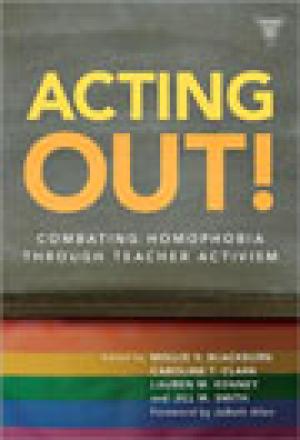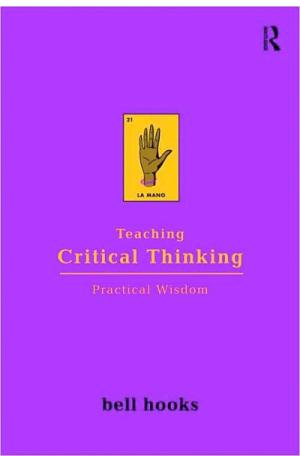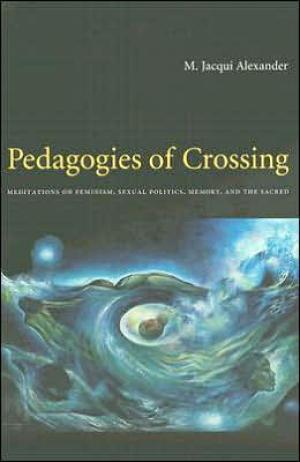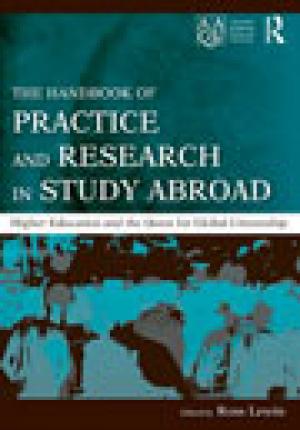Resources
This article outlines an ongoing method the author developed for seeking to enable predominantly White students in theological education (those training for authorized public ordained ministry) to engage with the central tenets of racial justice. The quest for racial justice has been an important part of the mission of the major church denominations in the United Kingdom over the past twenty years, as they have declared that "Racism is a sin." Ordained ministers are now charged with the task of seeking to lead church congregations into faithful, anti-racist forms of practice – namely, the quest for racial justice. This paper outlines the working method the author has developed in order to conscientize ministers in training for this significant task.

In this volume, teachers from urban, suburban, and rural districts join together in a teacher inquiry group to challenge homophobia and heterosexism in schools and classrooms. To create safe learning environments for all students they address key topics. (From the Publisher)
One page Teaching Tactic: an exercise that treats student groups unequally, to learn about empathetic identification with biblical figures.
A challenging intercultural teaching experience provided an opportunity for engaging embodied pedagogies that facilitated border crossings of language, age, gender, and experience. Influenced by the work of Augusto Boal, the author describes how improvisation, role-play, music, and drawing led seminary students in Mexico into sacred time and space toward relevant learning. Drawing upon the critical pedagogy of several educators yields implications for teaching theology and religion. The essay also invites readers into dialogue about how such border crossings can benefit their own teaching.
This article contends that teaching more effectively for diversity requires a radical re-envisioning of pedagogical practice. Drawing on qualitative interviews with religion and theology professors of color throughout the United States, it explores how faculty can re-imagine their teaching by engaging students where they are, acknowledging the reality of oppression, and dealing with resistance. Stressing mindfulness of social location, it provides examples of liberating teaching activities and competences and shows how literary and visual "texts" from the margins and personal metaphors of embodiment can challenge captivities to hegemonic paradigms in the classroom. The article concludes with responses from colleagues who have worked closely with the author. Ethicist Melanie Harris brings Hill's method into dialogue with Womanist pedagogy, and historian of religion Hjamil Martínez-Vázquez reflects on the role of suffering in building a revolutionary/critical pedagogy.
The Iliff School of Theology established a justice and peace concentration within its curriculum to respond to the challenges of racism, class and economic exploitation, sexism, and militarism by fostering social analysis and attending to the contributions of religious thought and resources to the struggles of social change. Within an institution and with a student body who both tend to be relatively privileged in terms of class and racial or ethnic background, one of the persistent issues in teaching justice and peace studies has been addressing the emergence of guilt, anger, and despair as course content challenges students (and faculty) to relinquish self-understandings, historical understandings of their religious tradition and national context, and inadequate theological and faith formation shaped by dominant narratives that ignore social realities of oppression. This pedagogical challenge has encouraged multiple professors to develop unique pedagogical approaches to educating students about justice issues in this context. This paper will draw on the insights of these approaches, in conversation with literature-based analysis, to describe the temptations students experience when learning about justice and peace in contexts of privilege. This paper also describes the pedagogical practices that emerged in this particular context, and the failures and limitations of these practices for individual and institutional transformation.
New technologies provide tools to reconstruct education as we undergo dramatic technological revolution and enter a new millennium. In particular, multimedia technologies, like CD-ROMs and Internet websites produce new resources and material for expanding education. In examining the Shoah Project—which documents the experiences of survivors of the Holocaust—, we demonstrate how this project provides important tools for historical and religious education, as well as making the reality of the Holocaust vivid and compelling in the contemporary moment. It is within this context that we discuss how multimedia can provide an important supplement to multicultural education, bringing the experiences of marginal and oppressed groups to the mainstream. Yet we also argue that effective multimedia education also requires historical contextualization, the skills of media literacy, and engaging pedagogical presentation in the classroom to make such new technologies effective as a supplement to traditional classroom and print-based education. Hence, we show how educational technologies, such as those produced by the Shoah Foundation and the UCLA Film and Television Archives, can help reconstruct education for the next century.

In Teaching Critical Thinking, renowned cultural critic and progressive educator bell hooks addresses some of the most compelling issues facing teaching issues facing teachers in and out of the classroom today. In a series of short, accessible, and enlightening essays, hooks explores of the confounding and sometimes controversial topics that teachers and students have urged her to address since the publication of the previous best-selling volums in her Teaching series, Teaching to Transgress and Teaching Community. The issues are varied and broad, from whether meaningful teaching can take place in a large classroom setting to confronting issues of self-esteem. One professor, for example, asked how black female professors can maintain positive authority in a classroom without being seen through the lens of negative racist, sexist stereotypes. One teacher asked how to handle tears in the classroom. while another wanted to know how to use humor as a tool for learning. Addressing questions of race, gender, and class in this work, hooks discusses the complex balance that allows us to teach, value, and learn from works written by racist and sexist authors. Highlighting the importance of reading, she insists on the primacy of free speech, a democratic education of literacy. Throughout these essays, she celebrates the transformative power of critical thinking. This is provocative, powerful, and joyful intellectual work. It is a must read for anyone who is at all interested in education today. (From the Publisher)

M. Jacqui Alexander is one of the most important theorists of transnational feminism working today. Pedagogies of Crossing brings together essays she has written over the past decade, uniting her incisive critiques, which have had such a profound impact on feminist, queer, and critical race theories, with some of her more recent work. In this landmark interdisciplinary volume, Alexander points to a number of critical imperatives made all the more urgent by contemporary manifestations of neoimperialism and neocolonialism. Among these are the need for North American feminism and queer studies to take up transnational frameworks that foreground questions of colonialism, political economy, and racial formation; for a thorough re-conceptualization of modernity to account for the heteronormative regulatory practices of modern state formations; and for feminists to wrestle with the spiritual dimensions of experience and the meaning of sacred subjectivity. In these meditations, Alexander deftly unites large, often contradictory, historical processes across time and space. She focuses on the criminalization of queer communities in both the United States and the Caribbean in ways that prompt us to rethink how modernity invents its own traditions; she juxtaposes the political organizing and consciousness of women workers in global factories in Mexico, the Caribbean, and Canada with the pressing need for those in the academic factory to teach for social justice; she reflects on the limits and failures of liberal pluralism; and she presents original and compelling arguments that show how and why transgenerational memory is an indispensable spiritual practice within differently constituted women-of-color communities as it operates as a powerful antidote to oppression. In this multifaceted, visionary book, Alexander maps the terrain of alternative histories and offers new forms of knowledge with which to mold alternative futures. (From the Publisher)

If we are all becoming global citizens, what then are our civic responsibilities? Colleges and universities across the United States have responded to this question by making the development of global citizens part of their core mission. A key strategy for realizing this goal is study abroad. After all, there may be no better way for students to acquire the knowledge, skills, and attitudes required to become effective change-agents in international contexts. The Handbook of Practice and Research in Study Abroad is a comprehensive survey of the field. Each chapter eloquently conveys an enthusiasm for study abroad alongside a critical assessment of the most up-to-date research, theory and practice. This contributed volume brings together expert academics, senior administrators, practitioners of study abroad, and policy makers from across the United States, Canada and other part of the world, who meticulously address the following questions: What do we mean by global citizenship and global competence? What are the philosophical, pedagogical and practical challenges facing institutions as they endeavor to create global citizens? How is study abroad and global citizenship compatible with the role of the academy? What are the institutional challenges to study abroad, including those related to ethics, infrastructure, finances, accessibility, and quality control? Which study abroad programs can be called successful? The Handbook of Practice and Research in Study Abroad is an indispensable reference volume for scholars, higher education faculty, study abroad professionals, policy makers, and the academic libraries that serve these audiences. It is also appropriate for a wide range of courses in Higher Education Master’s and Ph.D. Programs. (From the Publisher)